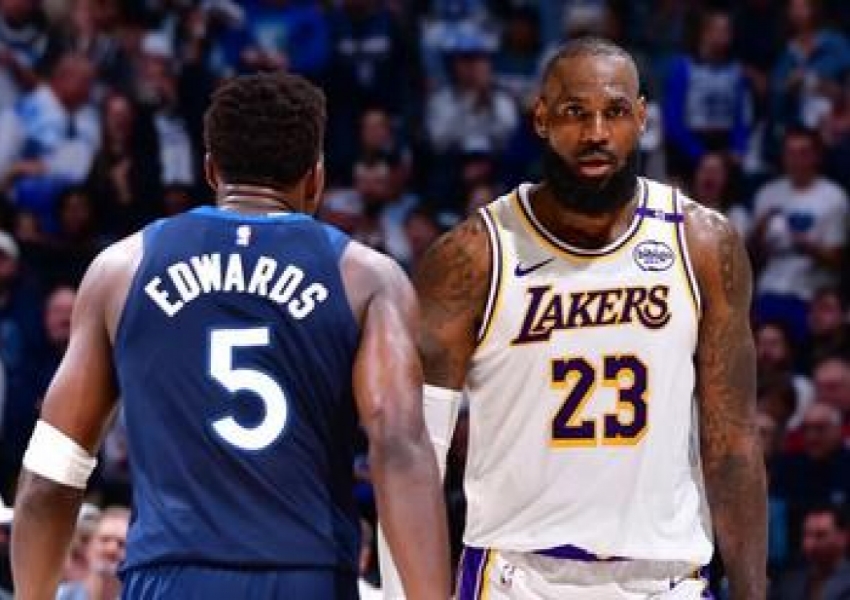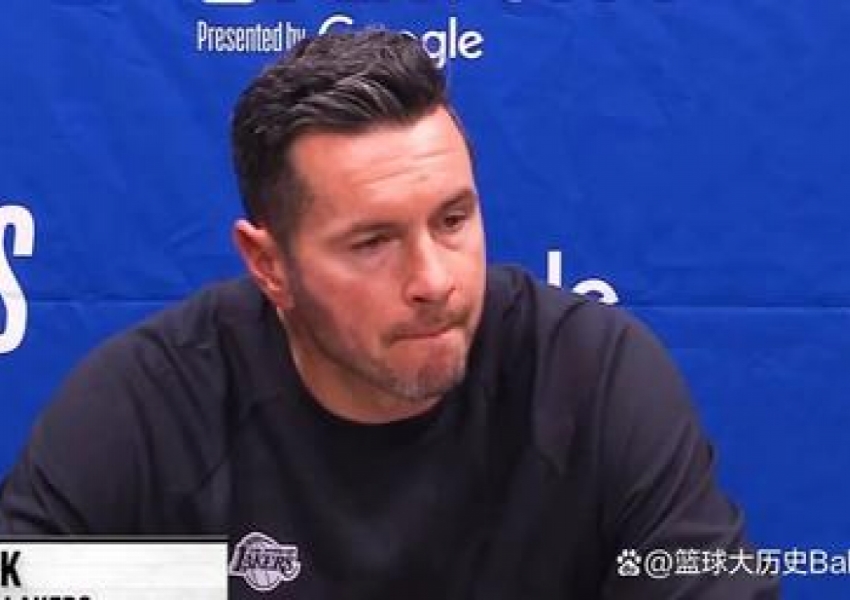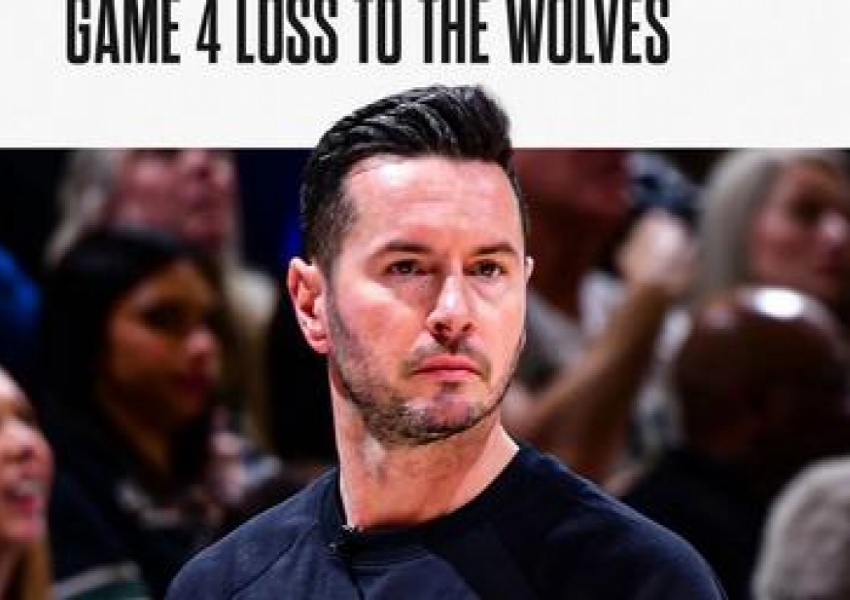Historic First! Redick's Rotational Controversy, Where Did the Lakers Lose?
The Los Angeles Lakers’ chances of advancing in the playoffs took a major hit in their Game 4 loss to the Minnesota Timberwolves, falling 113-116 and finding themselves down 1-3 in the series. With only a 4.6% chance of advancing when trailing 1-3 in a series, the Lakers are staring down the barrel of elimination, and the pressure is mounting. The Lakers’ loss has sparked not only debates about the team’s chances but also about the decisions made by first-year head coach JJ Redick, who is already facing criticism for his rotational choices and late-game strategy.

Historically, teams that have trailed 1-3 in a playoff series have had an incredibly slim chance of pulling off a comeback. The most recent teams to do so were the 2020 Denver Nuggets, who staged remarkable recoveries against both the Utah Jazz and Los Angeles Clippers. Before that, the 2016 Cleveland Cavaliers, led by LeBron James, completed a stunning comeback in the NBA Finals, overcoming a 1-3 deficit to win the championship. However, what was remarkable about those comebacks was the presence of elite players like LeBron James and Nikola Jokic, players who could carry their teams with exceptional performances. This year, LeBron’s Lakers are facing a significantly different set of challenges, and while LeBron’s ability to deliver in crunch time is unquestionable, he is no longer the 31-year-old player who orchestrated a historic comeback against the Warriors in 2016.

This Game 4 loss was especially bitter for the Lakers, as they were in control for much of the contest. The Lakers came out strong, with LeBron James and Luka Doncic combining for 22 points in the first quarter, and at halftime, they had a solid 43-point performance. Meanwhile, Austin Reaves was limited to just 10 minutes of play in the first half due to foul trouble, allowing him to conserve energy for the second half. In the third quarter, James, Doncic, Reaves, Rui Hachimura, and Dorian Finney-Smith combined to score 36 points, helping the Lakers build a 10-point lead, 94-84, entering the final period. It looked like the series could be tied 2-2, and the Lakers might have taken control.

However, the fourth quarter proved to be a disaster for the Lakers. Minnesota, led by the electric Anthony Edwards, came alive with a 32-19 run, erasing the Lakers’ lead. With just seconds remaining, Reaves and Finney-Smith hit back-to-back threes to put the Lakers up by two, 113-111. But the final minutes became a nightmare for Los Angeles. In the next four possessions, the Timberwolves would go on to regain the lead and secure the win. Jaden Ivey's 2+1 gave the Timberwolves a one-point lead, followed by a LeBron turnover on an inbounds pass. Then, Edwards drew a foul on James, hitting both free throws to put the Wolves ahead. Finally, Reaves missed a potential game-tying three-pointer, sealing the Lakers' fate.
While LeBron certainly bears some responsibility for the loss with a turnover and a critical foul, it would be unfair to place all the blame on him. LeBron had played an exhausting 46 minutes of basketball, constantly guarding one of the NBA's most explosive players, and at 40 years old, he’s not physically capable of playing that much without experiencing some wear and tear. In fact, fatigue was a problem for the entire Lakers team in the fourth quarter, and a significant portion of that fatigue can be traced back to Redick’s management of the rotation.
Redick’s decision to play his starters for the entire second half was an unprecedented move in NBA history. Since official tracking began in the 1996-97 season, it was the first time in playoff history that a starting five had played an entire half without substitution. This isn’t even something we’ve seen from legendary coaches like Tom Thibodeau, known for overplaying his key players. It’s a decision that raises serious questions about Redick’s understanding of playoff rotation management and the physical toll it takes on players over the course of a grueling postseason series.
While the Lakers’ starting lineup of LeBron, Doncic, Reaves, Hachimura, and Finney-Smith had been effective during the regular season—outscoring opponents by 18.6 points per 100 possessions—this strategy of leaving them on the floor for the entire second half was too much. Even the best lineups can’t maintain peak performance without any rest, and that’s exactly what Redick asked of his players in Game 4. While it’s understandable that Redick wanted to keep his best players on the floor during a critical game, he made a significant mistake in not giving them a breather, especially with LeBron and Doncic logging major minutes.
Furthermore, Redick’s timing with challenges also left much to be desired. Early in the second quarter, he used a challenge on a potentially questionable push-off foul when the previous play had seen a clear out-of-bounds call go unchallenged. This early use of the challenge meant that the Lakers were unable to challenge crucial calls in the final moments of the game, such as when Doncic was fouled on a drive in the final seconds. Instead of heading to the free-throw line for a chance to tie the game, the Lakers were forced to use a timeout to retain possession, which ultimately led to LeBron’s costly inbounds turnover.
To make matters worse, Redick’s decision to call a timeout late in the fourth quarter, just after Edwards had stepped out of bounds, was rendered ineffective by Timberwolves coach Chris Finch. Finch wisely used the time Redick had called to challenge the out-of-bounds play, and the challenge resulted in a foul on LeBron, giving Edwards the chance to hit two crucial free throws that pushed the Timberwolves ahead. Finch’s experience and tactical awareness in this moment stood in stark contrast to Redick’s rookie mistakes.
While the blame for the loss cannot rest solely on Redick’s shoulders, his decisions on rotations and in-game management were certainly factors that contributed to the Lakers' defeat. If the Lakers had won, these mistakes might have been overlooked, but now, with their backs against the wall, the scrutiny of Redick’s coaching will intensify. One of the Lakers’ primary issues this season has been their lack of depth in the frontcourt. They have been dominated in the paint in all three losses to the Timberwolves, and the absence of a reliable big man who can protect the rim or contribute offensively has been a glaring weakness.
The Timberwolves, on the other hand, are on the brink of a historic upset, and their star player, Anthony Edwards, has been outstanding. Edwards scored 43 points, grabbed 9 rebounds, and dished out 6 assists in Game 4, showcasing why he is one of the brightest young stars in the league. If the Timberwolves manage to close out this series, Edwards will have done something very few players have been able to do—eliminate both Kevin Durant and LeBron James from the postseason in consecutive years. It would be a career-defining achievement for Edwards and would set the stage for a showdown against Stephen Curry in the second round.
For the Lakers, the task now seems almost insurmountable. Down 1-3, they will need to win three consecutive games to keep their season alive. Redick will have to make some serious adjustments if he wants to prevent a first-round exit. He cannot afford to overwork his stars, especially with LeBron already showing signs of fatigue. Furthermore, the Lakers need to find a way to address their lack of interior presence. Without a reliable center to provide defensive stability and scoring inside, they will continue to struggle against teams like the Timberwolves that have a strong, physical frontcourt.
LeBron and Doncic are capable of carrying the Lakers, but even they can’t do it all alone. The Lakers will need contributions from their role players, and Redick needs to find a way to balance his rotation and make better use of his bench. If the Lakers can’t find a way to address these issues, it’s hard to see how they can come back from a 1-3 deficit. The Lakers’ future is uncertain, but if they do manage to pull off an unlikely comeback, it will be a testament to the incredible talent of LeBron and Doncic, who still have the ability to perform under pressure.
Copyright Statement:
Author: focusnba
Source: FocusNBA
The copyright of this article belongs to the author. Reproduction is not allowed without permission.
Recommended Blog
- Matching Greatness: Just How Special Has Jalen Brunson Been in These Playoffs?
- Dominating the Lakers: Just How Good Is Julius Randle in the Playoffs?
- Lakers Sent Packing in Round One: Who’s Really to Blame?
- $297 Million for 22-Year-Old Paolo Banchero — Is He Worth It?
- Farewell Milwaukee: The Bucks Are Stuck, and Giannis' Next Chapter Awaits
- From #1 High School Player in America to the NBA's Toughest Enforcer: What Did Isaiah Stewart Go Through?
- -44 Plus A Disastrous Performance: Is Tyler Herro Really the Face of the Miami Heat?
- A Talent Beyond LeBron, Offense Beyond Durant: The Rise and Fall of Michael Beasley, the NBA’s Most Recognized Wasted Talent
- Trade Rumors Emerge: Where Will Giannis Antetokounmpo Go Next?
- Achilles Tear? Lillard's Injury and Giannis' Potential Departure